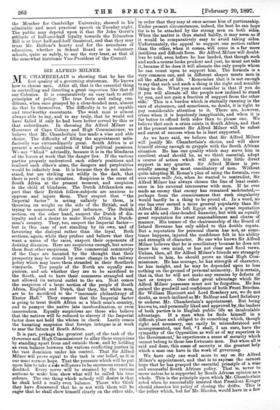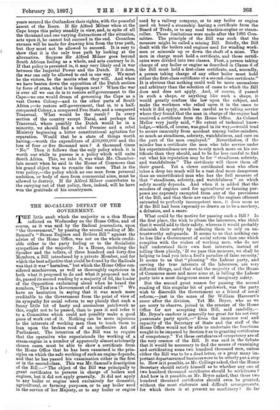SIR ALFRED MILNER.
MR. CHAMBERLAIN is showing that he has the first quality of a governing statesman. He knows how to choose men. After all, that is the essential thing in controlling and directing a great imperium like that of our Colonies. It is comparatively an easy task to settle principles of policy. The true facts and ruling con- ditions, when once grasped by a clear-headed man, almost do that by themselves. The difficulty is to get capable and trustworthy executants. The weak man is almost always able to say, and to say truly, that he would not have failed if only he had been better served by this or that subordinate. In choosing Sir Alfred Milner as Governor of Cape Colony and High Commissioner, we believe that Mr. Chamberlain has made a wise and able choice. The difficulty of filling the appointment satis- factorily was extraordinarily great. South Africa is at present a seething cauldron of blind political passions.
We say " blind " advisedly, because it is in the blindness of the -forces at work that the danger lies. If the various parties properly understood each other's positions and realised each other's- aims, the dangers and perplexities would be infinitely less. It is because they do not under- stand, but are striking out wildly in the dark, that there is peril in the situation. Suspicion is the curse of South Africa at the present moment, and suspicion is the child of blindness. The Dutch Afrikanders sus- pect that their British fellow-subjects are anxious to oppress and injure them. They suspect that "the Imperial factor" is acting unfairly to them, is throwing its weight on the side of the British, and is trying to counteract their just influence. The British section, on the other hand, suspect the Dutch of dis- loyalty and of a desire to make South Africa a Dutch- man's country. They, too, suspect the Imperial factor— but in this case of not standing by its own, and of favouring the disloyal rather than the loyal. Both sections, again, while they profess and believe that they want a union of the races, suspect their opponents of desiring disunion. Here are suspicions enough, but across them float other suspicions. The commercial community of the Cape are haunted by the thought that their prosperity may be ruined by some change in the railway policy which may leave them stranded in their Southern vineyards. The people of the North are equally sus- picious, and ask whether they are to be sacrificed to the South, and to have their commerce strangled and not allowed its natural outlet to the sea. Next comes the suspicion of a large section of the people of South Africa, English and Dutch, that they, the white men, are to be sacrificed to the "insensate philanthropy of Exeter Hall." They suspect that the Imperial factor is going to treat South Africa as a black man's country, and to pamper the native into insubordination, or even insurrection. Equally suspicious are those who believe that the natives will be reduced to slavery if the Imperial factor does not hold the whites in check. Lastly comes the haunting suspicion that foreign intrigue is at work to mar the future of South Africa.
It is part, perhaps the greatest part, of the task of the Governor and High Commissioner to allay these suspicions by standing apart from and outside thew, and by holding an even balance between the various conflicting parties in the vast dominion under his control. That Sir Alfred Milner will prove equal to the task is our belief, as it is our most earnest hope. That the pressure which will be put upon him to take a side will prove to be enormous cannot be doubted. Every nerve -will be strained by the various sections to make him show what will be called his true colours. The one thing which nobody will desire is that he shall hold a really even balance. Those who think they have discovered that he is not with them will be eager that he shall show himself clearly on the other side, in order that they may at once accuse him of partisanship. Under present circumstances, indeed, the best he can hope for is to be attacked by the strong men on both sides.
When the matter is thus stated baldly, it may seem as if it would be comparatively easy to avoid taking sides.
Unfortunately, the appeal to support one section rather than the other, when it comes, will come in a far more insidious and difficult form. Sir Alfred Milner will doubt- less be told, even before he has landed, that though such and such a course looks prudent and just, he must not take it, because if he does it will alienate the only people whom he can count upon to support him. The formula is a very common one, and in different shapes meets men in all the affairs of life. 'Remember that it is not enough to say that such and such a thing is the right and sensible thing to do. What you must consider is that if you do it you will alienate all the people now inclined to stand by you, and not gain a fraction of support from the other side.' This is a burden which is eternally running in the ears of statesmen, and sometimes, no doubt, it is right to pay considerable attention to it. There are, however, crises when it is hopelessly inapplicable, and when it is far better to offend both sides than to please one. We believe that such a crisis exists in South Africa, and that at the present moment Sir Alfred Milner will be safest and surest of success when he is least supported.
As we have said, we believe that Sir Alfred Milner will justify Mr. Chamberlain's choice, and will show himself strong enough to grapple with the South African situation. He has one quality which may serve him in excellent stead should he, as we think essential, adopt a course of action which will gain him little direct support in any quarter. Sir Alfred Milner is per- sonally among the most conciliatory of men. Without quite adopting M. Renan's plan of using the formula, vows avez raison milk lois, when he wanted to oontradict, Sir Alfred Milner has always chosen the line of least resist- ance in his external intercourse with men. If he ever made an enemy that enemy has remained undetected,— perhaps from the consciousness that such singularity would hardly be a thing to be proud of. In a word, no one has ever earned a more general popularity than Sir Alfred Milner. He left Egypt with a great reputation as an able and clear-headed financier, but with an equally great reputation for sweet reasonableness and charm of manner. His tenure of the chairmanship of the Board of Inland Revenue has only added to this double repute. But a reputation for personal charm has not, as some- times happens, injured the confidence felt in his ability and strength of character. No one who knows Sir Alfred Milner believes that he is conciliatory because he does not know his own mind, or has not clear and fixed views. Unless, then, all Sir Alfred Milner's friends are strangely deceived in him, he should prove an ideal High Com- missioner. He has courage, he has strength of character, he has insight, and he may be depended upon to lose nothing on the ground of personal animosity. It is certain, that is, that he will not make any enemies by defects of tact or temper. One other great advantage which Sir Alfred Milner possesses must not be forgotten. He has gained the goodwill and confidence of both Front Benches. Sir William Harcourt and Lord Rosebery are, we do not doubt, as much inclined as Mr. Balfour and Lord Salisbury to endorse Mr. Chamberlain's appointment. But being known to, and personally liked and approved by, the leaders of both parties is in English public life an incalculable advantage. If a man when he finds himself in a difficult place and obliged to do something which, though right and necessary, can easily be misunderstood and misrepresented, can feel, I shall, I am sure, have the sympathy of the Opposition as well as of my superiors in the Government,' he experiences a sense ef security which cannot belong to those less fortunate men. But when all is said and done, this sense of security is the greatest help which a man can have in the work of governing.
We have only one word more to say on Sir Alfred Miler's appointment, and that is to express the earnest hope that he has grasped the essential principle of a wise and successful South African policy. That is, never to move unless he is supported by South African opinion as .a whole. This is the principle upon which Mr. Chamberlain acted when he successfully insisted that President ICruge.r should abandon his policy of closing the drifts. This is the policy which, but for Mr. Rhodes, would have in a few years secured the Outlanders their rights, with the peaceful assent of the Boers. If Sir Alfred Milner when at the Cape keeps this policy steadily in view, and, in spite of all the thousand and one varying distractions of the situation, acts upon it, he cannot but succeed in the end. Countless excuses will be made for drawing him from the true path, but they must not be allowed to succeed. It is easy to show that it is the only true path by looking at the alternative. Suppose Sir Alfred Milner goes beyond South African feeling as a whole, and acts contrary to it. If that policy is persisted in, it may very likely end in war between the Imperial Power and the Dutch. If it does, the war can only be allowed to end in one way. We must be the victors, be the merits what they will. And when we have beaten down the opposition of the Dutch section by force of arms, what is to happen next ? When the war is over all we can do is to restore self-government to the Cape—no one would dream of governing the Cape as a vast Crown Colony—and to the other parts of South. Africa ;—to restore self-government, that is, to a half- conquered Colony, a conquered Free State, and a conquered Transvaal. What would be the result ? In every section of the country except Natal, and perhaps the Transvaal, where possibly the Dutch would be in a minority, we should find a rebel Premier and a rebel Ministry beginning a bitter constitutional agitation for separation. Would that be a state of things worth having,—worth the expenditure of £50,000,000 and the loss of four or five thousand men ? A thousand times "No." Then it follows that the only policy which it is worth our while to pursue is a policy which will unite South Africa. This, we take it, was what Mr. Chamber- lain meant when he said in the House of Commons that his grand object was to reunite the races. That 12 the true policy,--the policy which no one man from personal ambition, or body of men from commercial aims, must be allowed to destroy. If Sir Alfred Milner contributes to the carrying out of that policy, then, indeed, will he have won the gratitude of his countrymen.



































 Previous page
Previous page